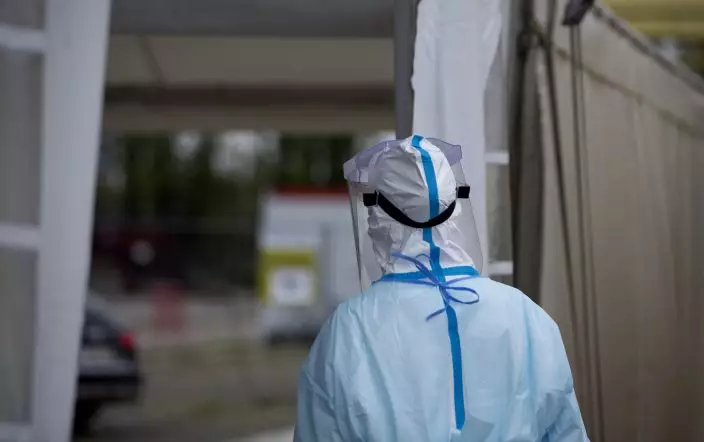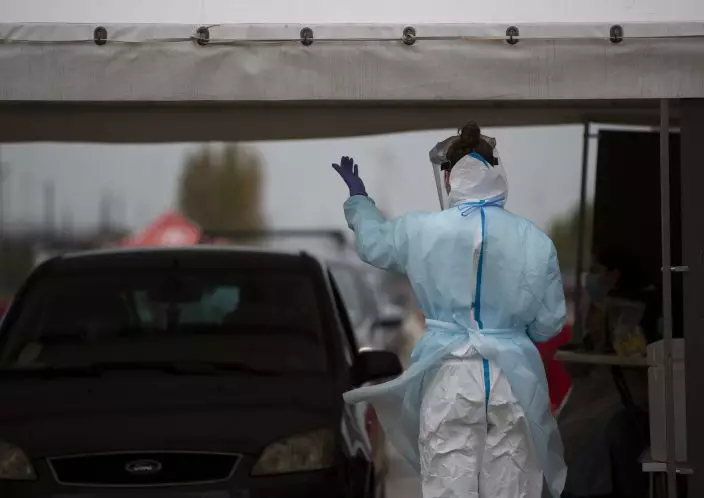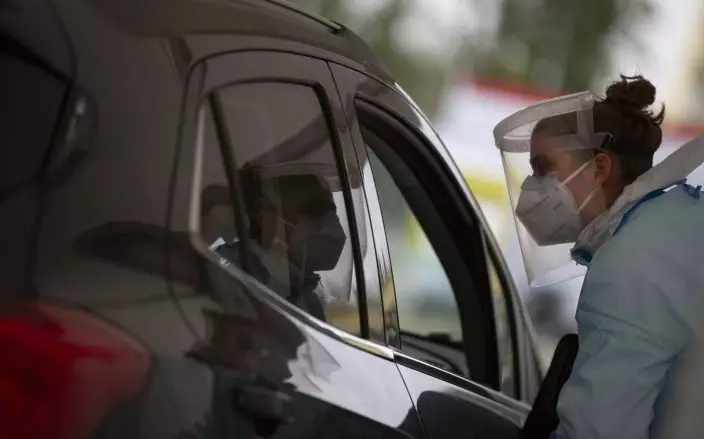Authorities in Belgium fear another deadly wave of coronavirus cases could soon hit care homes as the country confronts the risk of seeing its hospitals overwhelmed by COVID-19 patients, leading them to restrict nursing home visits.
The country of 11.5 million inhabitants recorded half of its COVID-19-related deaths in such homes during the spring wave of the pandemic. Amid a new surge in confirmed cases, new infections have been growing at an alarming rate in eldercare facilities.
In the Dutch-speaking region of Flanders, coronavirus infections in care homes have risen by 51% and the number of deaths has doubled in the past week, according to local media quoting figures by the Flemish Agency for Care and Health. And the number of deaths has doubled over the past week.

A health care worker watches a car leave after she administered a nose-swab test at the mobile COVID-19 testing site in Antwerp, Belgium, Tuesday, Oct. 20, 2020. Bars and restaurants across Belgium have been shut down for a month and a night-time curfew entered into force Monday, as health authorities warned of a possible sanitary "tsunami" in the hard-hit corona country. (AP PhotoVirginia Mayo)
Care home employees worked during the pandemic's earlier peak with a shortage of tests, masks and protective equipment. To avoid a repeat of the situation, nursing home visits will now be limited until the curve of the current outbreak in Belgium flattens.
Vincent Frédéricq, the general secretary of the rest homes federation, said only the same two people will be allowed to visit a home resident for a 15-day period. For the following two weeks, residents will be allowed to replace their visitors with two different people.
The permitted visitors will be required to wear masks and to keep safe distance from the people they are visiting.

People wait in their cars in a line to be tested at the mobile COVID-19 testing site in Antwerp, Belgium, Tuesday, Oct. 20, 2020. Bars and restaurants across Belgium have been shut down for a month and a night-time curfew entered into force Monday, as health authorities warned of a possible sanitary "tsunami" in the hard-hit corona country. (AP PhotoVirginia Mayo)
“It can be a bad experience for some people, but the situation in the country is serious, and we have to be careful," Frédéricq told RTL media.
Belgium has reported more than 240,000 confirmed virus cases and more than 10,000 deaths during the pandemic. After keeping infections in check over the summer, the Belgian government said the country's health situation is now one of the worst in Europe.
As of Wednesday, 2,969 COVID-19 patients were hospitalized, including 486 in intensive care. Authorities have warned that intensive care units will hit their capacity of 2,000 beds by mid-November if new cases continue to soar at the same pace.

A health care worker directs a car to move forward as she prepares to administer a nose-swab test at the mobile COVID-19 testing site in Antwerp, Belgium, Tuesday, Oct. 20, 2020. Bars and restaurants across Belgium have been shut down for a month and a night-time curfew entered into force Monday, as health authorities warned of a possible sanitary "tsunami" in the hard-hit corona country. (AP PhotoVirginia Mayo)
While younger people account for most of Belgium's current cases, more than 700 infections were registered last week among people over age 90, compared to 300 the previous week, said COVID-19 crisis center spokesman Yves Van Laethem.
The exponential infection growth rate has created day-long lines at testing centers, prompting the government to stop testing people who do not show COVID-19 symptoms. Health authorities said testing priority will still be given to new residents in care homes and people over age 65 in other care institutions.
The Belgian government last week introduced more restrictive measures including a night-time curfew as well as closing restaurant and bars for a month.

A health care worker speaks with a man in a car as she prepares to administer a nose-swab test at the mobile COVID-19 testing site in Antwerp, Belgium, Tuesday, Oct. 20, 2020. Bars and restaurants across Belgium have been shut down for a month and a night-time curfew entered into force Monday, as health authorities warned of a possible sanitary "tsunami" in the hard-hit corona country. (AP PhotoVirginia Mayo)
Follow AP's pandemic coverage at http://apnews.com/VirusOutbreak and https://apnews.com/UnderstandingtheOutbreak


